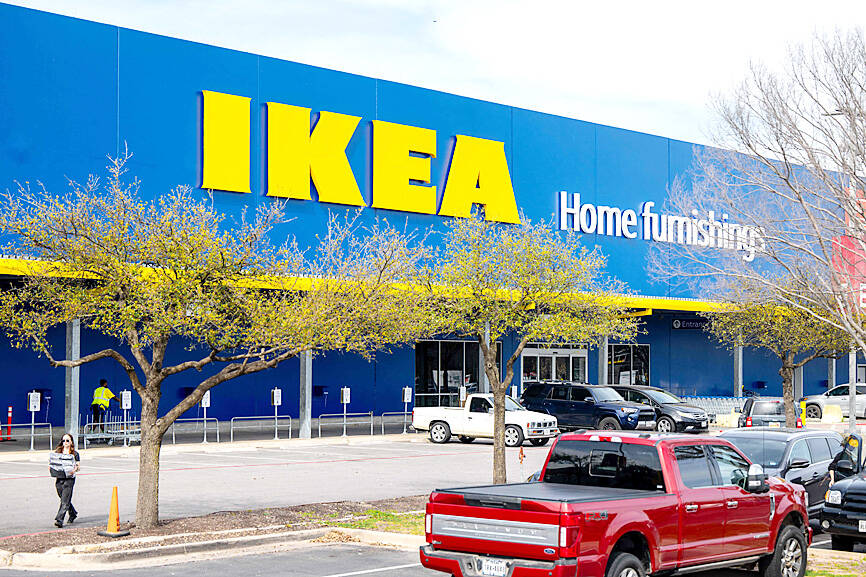Swedish furniture maker IKEA plans to spend about 300 million euros (US$327 million) in South Korea over the next three years to increase market share in the East Asian country.
“We are investing a lot in Asia,” Tolga Oncu, head of the company’s retail Ingka Group, said in an interview in Goyang, South Korea, on Saturday on his first visit to the country since 2018.
The group is to open another so-called blue box store in Seoul and is considering “many more smaller formats.”

Photo: AFP
IKEA, known for its do-it-yourself business model, has four outlets in South Korea, and offers online shopping and delivery. The company is seeking to increase consumers’ access to stores, Oncu said.
“Maybe you don’t need to walk more than 15 minutes to get your products in a convenience store or somewhere,” he said.
IKEA has in the past few years invested in automation improvement of its shipping service, which can lead to lower prices, he said.
“Korea has one of the highest quality of last-mile deliveries,” he said.
The brand is planning to cut prices globally and is looking at 10 percent to 20 percent reductions for key products in South Korea, he said.
In the US, IKEA has lowered retail costs on almost 1,000 products, including on its popular Billy bookcase, and plans to keep cutting.
The firm began the US price-cutting push in January and is also lowering prices across the more than 60 other markets where it operates. Consumers have responded by increasing their purchases of those cheaper items at IKEA stores.
The furniture maker sells 9,500 products and raised prices across the board for the first time in decades during the COVID-19 pandemic because of supply-chain disruptions. Now, declines in the prices of raw materials and lower transportation costs have enabled the cuts, the firm said.
“I think in general for IKEA worldwide, it is looking like this is going to be one of the biggest price reductions that we have ever done in one year,” Oncu said.

BYPASSING CHINA TARIFFS: In the first five months of this year, Foxconn sent US$4.4bn of iPhones to the US from India, compared with US$3.7bn in the whole of last year Nearly all the iPhones exported by Foxconn Technology Group (富士康科技集團) from India went to the US between March and last month, customs data showed, far above last year’s average of 50 percent and a clear sign of Apple Inc’s efforts to bypass high US tariffs imposed on China. The numbers, being reported by Reuters for the first time, show that Apple has realigned its India exports to almost exclusively serve the US market, when previously the devices were more widely distributed to nations including the Netherlands and the Czech Republic. During March to last month, Foxconn, known as Hon Hai Precision Industry

Taiwan Semiconductor Manufacturing Co (TSMC, 台積電) and the University of Tokyo (UTokyo) yesterday announced the launch of the TSMC-UTokyo Lab to promote advanced semiconductor research, education and talent development. The lab is TSMC’s first laboratory collaboration with a university outside Taiwan, the company said in a statement. The lab would leverage “the extensive knowledge, experience, and creativity” of both institutions, the company said. It is located in the Asano Section of UTokyo’s Hongo, Tokyo, campus and would be managed by UTokyo faculty, guided by directors from UTokyo and TSMC, the company said. TSMC began working with UTokyo in 2019, resulting in 21 research projects,

Taiwan’s property market is entering a freeze, with mortgage activity across the nation’s six largest cities plummeting in the first quarter, H&B Realty Co (住商不動產) said yesterday, citing mounting pressure on housing demand amid tighter lending rules and regulatory curbs. Mortgage applications in Taipei, New Taipei City, Taoyuan, Taichung, Tainan and Kaohsiung totaled 28,078 from January to March, a sharp 36.3 percent decline from 44,082 in the same period last year, the nation’s largest real-estate brokerage by franchise said, citing data from the Joint Credit Information Center (JCIC, 聯徵中心). “The simultaneous decline across all six cities reflects just how drastically the market

Ashton Hall’s morning routine involves dunking his head in iced Saratoga Spring Water. For the company that sells the bottled water — Hall’s brand of choice for drinking, brushing his teeth and submerging himself — that is fantastic news. “We’re so thankful to this incredible fitness influencer called Ashton Hall,” Saratoga owner Primo Brands Corp’s CEO Robbert Rietbroek said on an earnings call after Hall’s morning routine video went viral. “He really helped put our brand on the map.” Primo Brands, which was not affiliated with Hall when he made his video, is among the increasing number of companies benefiting from influencer